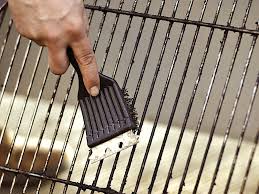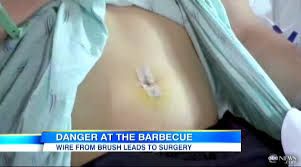 A growing hazard in the summer backyard can be found in the wire bristle brushes commonly used to clean barbecue grills, a researcher reported here.
A growing hazard in the summer backyard can be found in the wire bristle brushes commonly used to clean barbecue grills, a researcher reported here.
A 55-year-old woman came to the emergency department with acute onset pain in the left side of her abdomen. She reported having eaten at a family barbecue the night before, and had a history of cesarean sections and abdominal adhesions, according to Pranith Perera, MD, of Brown University in Providence, R.I.
Her abdomen was distended, and laboratory tests revealed leukocytosis. On a CT examination of the abdomen and pelvis, a 7-mm density was identified in the lower left quadrant with possible perforation of the wall of the jejunum.
Spiral enteroscopy detected a foreign object located about 90 cm from the pylorus. This was removed with forceps and turned out to be a wire brush bristle.
“We’ve had six or seven cases of this just within the last 18 months, all within 24 hours of the patient eating grilled food,” Perera told MedPage Today during a poster session at the annual meeting of the American College of Gastroenterology.
“These bristles are very small and thin, and can stick to the grill. Patients may not even feel it, and there have been cases of neck and tonsil perforation, abscesses, and intestinal perforations requiring rapid surgical intervention,” he said.
“There has been a lot of blame in terms of cheaper products, and how they’re manufactured,” he added.
The Consumer Product Safety Commission is currently collecting data to see if there are specific brands and designs of brushes that are particularly hazardous, if the type of grill matters, such as those made of uncoated or porcelain-coated cast iron, and if there’s an association with particular types of food.
The CDC now recommends that alternative methods of cleaning barbecue grills be employed, or at least that very careful inspection of the grill be done after cleaning to ensure that no bristles adhere to the surface.
If this type of ingestion and potential abdominal injury is suspected, abdominal/pelvic CT scan should be done without oral contrast, which could obscure the bristle, according to Perera.
 This patient’s abdominal pain resolved after the foreign body was removed, and there was no evidence of abscess or peritoneal air. She was discharged on oral antibiotics.
This patient’s abdominal pain resolved after the foreign body was removed, and there was no evidence of abscess or peritoneal air. She was discharged on oral antibiotics.
“Physician awareness of this potential injury is critical to facilitate timely diagnosis and treatment. Awareness of this potential injury by the general population, manufacturers, and retailers can reduce exposures and decrease the likelihood of occurrence,” CDC has stated.
Source: Medpagetoday
